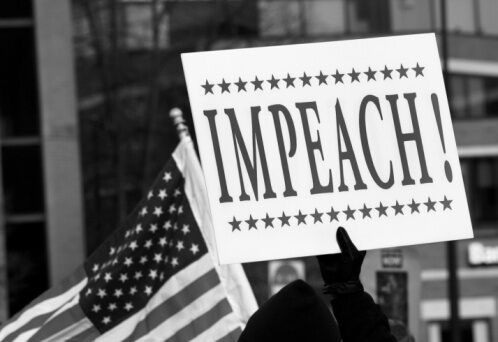Time To Talk Impeachment

(Courtesy of Flickr)
by Briana Valentina

During the Watergate era, the clear majority of Americans were not in favor of impeaching former President Nixon until August of 1974—the very month he resigned. In comparison, 64 percent of Americans opposed the impeachment of former President Clinton. The most recent poll from the Wall Street Journal says that about 40 percent of Americans want to start the impeachment process for President Trump. However, in each separate case, citizens of the president’s opposing party were the main contributors to those petitioning for impeachment. Rather than associating the notion of impeachment with the committing of crimes, people use impeachment as a way to express their disapproval of the President’s actions.
This brand of confusion is not only tolerated but exploited by the very government officials we are told to put our trust in. Citizens struggle to express their demands due to their misinterpretation of the inner workings of our government. As of late, the topic of impeachment is the latest in a series of antiquated governmental processes–more antiquated than one might assume.
According to the National Constitution Center, the concept of impeachment was created not by America’s founding fathers but by the English Parliament in the early 1300s. During the Constitutional Convention, Alexander Hamilton proposed that the American government should base its impeachment process off Parliament’s original process. This meant abiding by the tradition of legislature handling the trials, now known as the House of Representatives and the Senate.
However, this exact form of impeachment was deemed obsolete by Parliament not long after this decision. In 1999, the Joint Committee on Parliamentary Privilege Report affirmed that “the circumstances in which impeachment has taken place are now so remote from the present that the procedure may be considered obsolete.” So while our ancestors in Great Britain modernized their system, the United States government continued its death grip on not just a confusing, but an outdated process.
I repeat the word “process” because that’s what impeachment is: a process. Many people are not aware that if a President is impeached, that does not necessarily mean they will be removed from office. Instead, Congress can only commence the process if enough lawmakers decide that the sitting President has committed treason, perjury or other high crimes. From there, the operation can truly begin.
The New York Times details the course implemented by our founding fathers. The President can officially be impeached only if the majority of the House of Representatives determines they are guilty on at least one charge. The proceedings are than handled by the Senate, which plays the role of jury in the President’s trial. If at least two-thirds of the Senate determine the President is guilty, he is officially removed from office. A complex, obsolete system that is built to serve the government rather than the people it represents.
There are no standard rules for these trials. Before the trial proceeds, the Senate (a legislative body comprised of politicians) decides on the rules for each case. Former Representative Bob Barr served as House manager during the trial of President Clinton. He states that “The rules adopted by the Senate in the Clinton trial — including limiting the number of witnesses and the length of depositions — made it harder to prove a case compared with trials in federal court.” Over three quarters of Republican senators voted guilty while Democratic senators unanimously declared his innocence.
Anyone with experience in the political world (or any fan of “House of Cards”) recognizes that an overwhelming number of politicians are fueled by their own ulterior motives. Unfortunately, justice does not always prevail over those with hidden agendas. Therefore entrusting the task of terminating a President to the legislative branch is nothing short of naive. If the current President’s political party holds the majority of the Senate, there is simply no point in even holding the trial. No matter the crime, neither political party can provide a completely unbiased ruling concerning a President either denying or enforcing their legislature.
It is not difficult to understand why our impeachment process was built to mimic another country’s. At the time of America’s founding, the average person was not prepared to handle a responsibility as daunting as voting for a representative. Running a successful democracy with illiterate, uneducated citizens would have been near impossible without the safeguards implemented, giving final say to our appointed government officials. But we do not live in that time anymore. Citizens today are able to vocalize what they want from the government.
There are several alternatives to having the Senate vote on a President’s innocence. Personally, I agree with the system James Madison proposed, which would have tasked the Supreme Court with the authority of removing a President from office. But no matter which alternative is offered, the current system must be changed, sooner rather than later. The United States government has surpassed its label of old-fashioned, achieving the status of archaic. The American public has aged out of its developing phase and does not need to be held by the hand. That which chooses not to evolve will inevitably perish.














































































































































































































